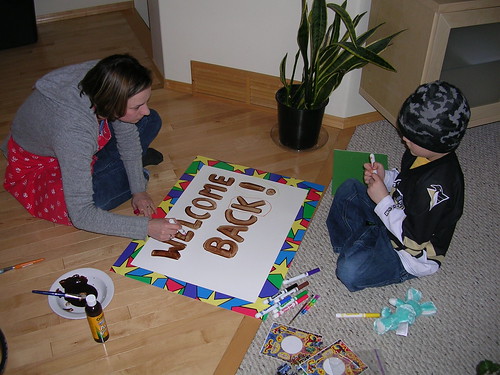There is no question that families everywhere experience stress when dealing with deployment. A family has to adjust together to an experience such as deployment, not just the deployed solider. Spouses and children face enormous stressors due to the lengthy and unpredictable absence of their family. What stresses do military spouses and their children experience during deployment?
Dating and the Military
An overlooked group of people who experience stress during deployment are the girlfriends of the military. Girlfriends do not have the same rights or benefits that military spouses do. They have the same stresses as the spouses plus the added stress of not being considered part of partner’s family, according to the government. Online discussion forums are a good place to discuss the stresses and receive advice from other women who have had the same experiences. Stresses identified in a study of these forums are things such as stress of having to put your own life on hold to support your significant other, the threat of infidelity while your significant other is gone, and general loneliness. Having people to talk to whether in an online forum or a support group on base has been proven to help deal with the stress of deployment. Being aware of own emotions and taking care of personal mental health helps the relationship with the military man and dealing with the stress of the deployment. Trying to keep the relationship “normal” during deployment such as discussing things other than the partner being away has shown to help relationships as it keeps focus away from the stresses of deployment. Yet complete avoidance of serious topics is also stressful to the relationship, complete openness brings couples together and forms stronger bonds in the relationship. When dealing with the stress of dating a deployed service member, remember that there is help and support available for girlfriends as well as spouses.
Support is available at these online forums:
http://www.militarytimes.com/forum/forumdisplay.php?180-Military-Girlfriends
http://www.experienceproject.com/groups/Am-A-United-States-Army-Girlfriend/41268/forum
http://www.militaryissuedgirlfriends.com/forum/
Spouses and Deployment
Some spouses experience being a single parent for the first time because of deployment. There is a large burden placed on the spouse now having to take care of the children on your own. Some studies have found that changing family dynamics, including role shifting and increasing parental demands, cause the most distress in parents. Things such as children’s behavioral problems and academic difficulties are just a few issues that you as civilian parents, will now have to deal with on your own. The following video highlights one military wife’s experiences with some of these stressors: [youtube]http://www.youtube.com/watch?v=XkLDP1KKfc4[/youtube]
It is important for spouses of deployed service members to seek out coping and adjustment strategies such as counseling and therapy during this time. Support for spouses of deployed military personnel is available at http://www.militaryfamily.org/get-info/mental-health-care/caring-for-the-caregiver/. This site also provides other links that can be helpful at the bottom of the website’s page.
Kids and Deployment
Deployment of a parent can be a difficult time for a child. Children may not understand what is happening during this confusing time and may have trouble expressing their feelings. These difficulties can show up both in school and at home.
Academics
Some studies have shown that children with deployed parents have lower test scores and academic performance than their peers. Others have found that these difficulties in school are at their worst immediately after the deployment, as well as when the parent has been away longer than expected. Not every child has trouble in school as a result of deployment, however, and it is important that teachers and school personnel do not assume that a child’s grades will fall. In fact, many children turn to their teachers and counselors for extra support during this tough time.
If you are a staff member assisting a child with a deployed parent, the Military Child Initiative at Johns Hopkins provides information on programs and assessments that may help a child cope academically with parental deployment at http://www.jhsph.edu/mci
If you are the parent of a child who is suffering academically, the Military Impacted Schools Association provides information on determining whether your child would benefit from special needs services at http://militaryimpactedschoolsassociation.org/
Emotional/Behavioral Effects
Children often cannot verbally express their emotions. Because of this, some children may behave differently when a parent is deployed, in order to “act out” his/her feelings. Studies indicate that young boys are more likely to react with anger and aggression, while some young girls may show signs of depression and anxiety. Adolescents may turn to risk-taking behavior, such as self-harm or illegal substances, to cope with a deployed parent. They may also experience a change in eating habits, dramatic mood changes, and physical complaints.
A news broadcast shows the emotional turmoil that kids may face during deployment from their point of view: [youtube]http://www.youtube.com/watch?v=uYHeDY1abwg[/youtube]
If you are the parent of a child who is exhibiting emotional difficulties, learn more about the emotional disorders common in children to identify whether your child may be suffering at http://www.nlm.nih.gov/medlineplus/childmentalhealth.html. For more specific information on child depression and the military, visit http://www.militarymentalhealth.org/resources/what-military-families-should-know-about-depression.aspx
Other Programs
The Family Advocacy Program (FAP) is “dedicated to the prevention, education, investigation, intervention, and treatment of spouse and child abuse”.
Community Family Therapy (CFT) has the goal of restoring communication within families by allowing family members to express all of their worries, fears, and insecurities about the deployment.
All of the above resources provide support during the time of deployment, as well as when the service member has returned. It is important to note that these stresses affect all families differently. You and your family will share a unique experience as you await the return of your service member!
References
Chandra, A., Martin, L. T., Hawkins, S. A., & Richardson, A. (2010). The impact of parental deployment on child social and emotional functioning: Perspectives of school staff. Jornal of Adolescent Health, 1-6.
Frisby, B.N., Byrnes, K., Mansson, D.H., Booth-Butterfield, M., & Birmingham, M. K. (2011). Topic Avoidance, Everyday Talk, and Stress in Romantic Military and Non-Military Couples. Communication Studies, 62(3), 241-257. doi:10.1080/10510974.2011.553982
Hamilton, S., Nelson-Goff, B. S., Crow, J. R., & Reisbig, A. J. (2009). Primary Trauma of Female Partners in a Military Sample: Individual Symptoms and Relationship Satisfaction. American Journal of Family Therapy, 37(4), 336-346. doi: 10.1080/01926180802529965
Jennings-Kelsall, V., Aloia, L. S., Solomon, D. H., Marshall, A. D., & Leifker, F. R. (2012). Stressors Experienced by Women Within Marine Corps Families: A Qualitative Study of Discourse Within an Online Forum. Military Psychology, 24(4), 363-381. doi: 10.1080/08995605.2012.695255
Lester, P., Peterson, K., Reeves, J., Knauss, L., Glover, D., Mogil, C., Duan, N., Saltzman, W., Pynoos, R., Wilt, K., & Beardslee, W. (2010). The long war and parental combat deployment: Effects on military children and at-home spouses. Journal of the American Academy of Child and Adolescent Psychiatry, 49(4). 310-320.
Lowe, K. N., Adams, K. S., Browne, B. L., Hinkle, K. T. (2012). Impact of military deployment on family relationships. Journal of Family Studies, 18(1).
NBCActionNews (Poster). (2010, November 10). Parent deployment causes stress for kids [Video]. Retrieved from http://www.youtube.com/watch?v=uYHeDY1abwg
Phelps, T., Dunham, M & Lyons, R. (2010). Military deployment and elementary student achievement. Educational Research Quarterly, 33. 37-52.
Sheppard, S. C., Malatras, J. W., & Israel, A. C. (2010). The impact of deployment on U.S. military families. American Psychologist, 65(6). 599-609. doi: 10.1037/a0020332
Soldiersmediacenter (Poster). (2010, November 29). Jennifer Giunta on deployment stress [Video]. Retrieved from http://www.youtube.com/watch?v=XkLDP1KKfc4
Verdeli, H., Baily, C., Vousoura, E., Belser, A., Singla, D., & Manos, G. (2011). The Case for Treating Depression in Military Spouses. Journal of Family Psychology, 25(4), 488-496. doi: 10.1037/a0024525
Image by flickr user The National Guard / CC licensed
Image by flickr user renewleeds / CC licensed
Image by flickr user tashwayne/ CC licensed



